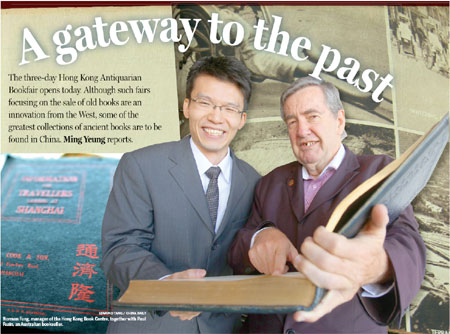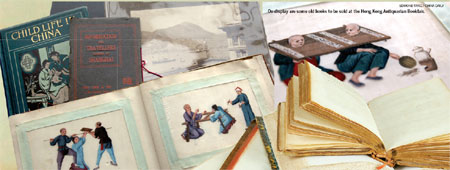A gateway to the past
Updated: 2010-12-03 07:13
By Ming Yeung(HK Edition)
|
|||||||
|
Norman Fung, manager of the Hong Kong Book Centre, together with Paul Feain, an Australian bookseller. Edmond Tang / China Daily |
|
On display are some old books to be sold at the Hong Kong Antiquarian Bookfair. Edmond Tang / China Daily |
The three-day Hong Kong Antiquarian Bookfair opens today. Although such fairs focusing on the sale of old books are an innovation from the West, some of the greatest collections of ancient books are to be found in China. Ming Yeung reports.
If you want to invest in some collectibles which will become value-added assets over time, what would you pick? Watches? Paintings? How about some old books?
How does one define "old" in the first place? "Strictly speaking, an old book is book that is a hundred years old," explains Paul Feain, owner of Cornstalk Bookshop in Sydney.
Feain cultivated a passion for collecting books in childhood. "I love books, read books and I got them as presents and I treasure them," he says proudly. He used to be a cab driver. "I kept driving around Sydney, and I kept going to bookshops." One day in 1980 he got bored with driving. At the same time there were piles of books in his home. That's when he started thinking about becoming a seller of antiquarian books.
He has been selling second-hand and old, valuable books for 30 years now.
It was tough getting going. "When you start, you don't really know about anything," Feain confesses. "You learn from your mistakes. You go around to bookshops and bookfairs. You ask questions, watch and observe and absorb your knowledge. Gradually your knowledge grows."
From the very beginning, most purchases were the result of advertising on the biggest newspapers that read "We pay good prices for good old books". Feain's business started to snowball and he found his niche in buying and selling antiquarian books.
"The difficult thing is finding enough money to buy the books you want to buy," he grins.
Since then, Feain has normally spent 60 percent of time in his shop and the remaining 40 percent traveling extensively to different places, negotiating with other book dealers to buy the books that he assumes are worthwhile.
By then well known in the field, ostentatious collectors would seek Feain's help, by all means, in acquiring the coveted acquisitions. "Someone might say 'I can give you a million dollars if you can get me this book', so you start working on it and finally you find the book. Then you have the pleasure of taking the book home, caressing it, looking at it and then you sell it," Feain says.
For Feain, being a book seller is more like a caretaker of the book. "After all, in this life, I don't really own that book. I only have it in my possessions for a certain amount of time," he admits.
After befriending some Japanese and South Korean antiquarian book dealers, Feain thought it was a good time a few years ago to include the Chinese in view of their rich culture and growing affluence.
"I have a dream that we are having a bookfair in Beijing," Feain says sincerely. "What I am trying to do is bring the East and West together."
"The Chinese have been collecting all sorts of things forever, ever since the Chinese civilization began keeping records," Feain jokes. "In some ways, the Chinese are better collectors than the people of the West."
"We must have intercourse with China. We got these Western book sellers and need to bring them to China. And Hong Kong is the best place to start," Feain stresses.
Now in its fourth year, the Hong Kong Antiquarian Bookfair will be held on December 3-5. The event has 35 book dealers from around the globe. It will feature distinguished booksellers displaying their old, rare and out-of-print books and ephemera for public sale to fit all pockets - from a few hundred Hong Kong dollars to tens of millions.
Feain, one of the co-organizers of the bookfair, said it is a place for people to window shop and to satisfy their curiosity about the world of antiquarian and collectable books.
The strong emphasis at the three-day fair will be the books about China and the books that had big influences on the culture of the world. "The books that really capture the spirits and lives of a time," adds Norman Fung, manager of the Hong Kong Book Centre.
Among them is Information for Travellers Landing at Shanghai, a travel book published by Thos. Cook & Son in London in 1912. It contains sufficient information and photos of all districts and a map of Shanghai.
"It is a 1912 version of Lonely Planet," Feain laughs. "It shows a China that doesn't exist anymore."
Another one is actually a souvenir brought home by a Western merchant from China 200 years ago. It is a beautiful and rare collection of original water-color paintings on rice papers with a silk border around the book showing old cruel Chinese punishments. "It was a time when the West was looking for new colonies and their people started to come to China. Like travelers today, they liked to take home souvenirs," Feain explains.
This kind of "weird" souvenir was not just a gift, it also gave the travelers something to impress their friends. "They would take this home and say 'this is what happens in China," Feain says.
The colors of the paintings do not fade away thanks to the careful preservation by its owners. One of the paintings shows two men attached by a wooden structure prevents either one from moving without the other's consent, like Siamese twins.
"Imagine if that's the person you hate," Feain jokes.
A century ago in China when sex education was given by parents in the home, the instructional drawings were important tools. They served as "pillow books" rather than pornography at the time.
"It was common for a man to present this to his son on his wedding day as sex instruction manual accompanied with Chinese poems. It is a beautiful object illustrating something important to the culture of the day," Feain says.
The "pillow books" on display in the bookfair are especially precious nowadays as many of which were either destroyed during the missionary period or the Cultural Revolution.
Hong Kong's humid and tropical weather is not ideal for preserving books in good condition, so Fung recommends people to keep them in a cool environment at 16 degrees Celsius. "Sunlight dehydrates the water in papers. Therefore, books need to be kept away from it."
Feain believes old books will play an ever more important role. "I see more and more people will be interested in collecting old books as the Internet spreads knowledge which helps educate people. As the world gets more educated, people turn back to the roots," Feain foresees.
New technology also saves people time, as Fung sees it, so they have more time for beautiful things. "The spread of knowledge and education is fantastic for antiquarian books business," Feain says confidently.
Thanks to online auction websites, book sellers can start small and save a lot of capital outlay to open a bookshop. Feain regards them as a wonderful platform to attract newcomers .
"But the problem of trading on these websites is a lack of consumer experience. You can hardly speak to the dealers," Fung notes.
In retrospect, Feain is glad he walked out of his comfort zone and made the bold decision to be a bookseller. "Had I stayed a taxi driver, I would have a taxi driver income and I would never have been able to buy expensive books," he says. "But in this business, I could have indulged in my fantasy."
(HK Edition 12/03/2010 page4)

